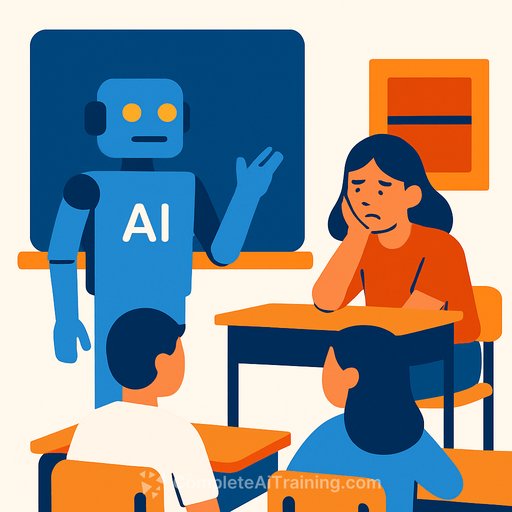National Survey Shows Declining Support for AI in K-12 Education
A recent national poll reveals a significant drop in public support for using artificial intelligence (AI) in K-12 classrooms. Support for AI-assisted lesson planning fell by 13%, AI for standardized test practice by 9%, and AI use in homework by 5% compared to last year.
Public Confidence in K-12 Schools Hits a Low
Confidence in American public schools has reached an all-time low, with just 13% of about 1,000 adults surveyed grading public schools an A or B. This marks a sharp decline from 24% in 2016 and 26% in 2004, according to the PDK Poll, conducted annually since 1969 by PDK International, a global educators organization.
Alongside declining school grades, the poll found increasing support for private school choice programs funded by public money and strong backing for diversity, equity, and inclusion (DEI) initiatives. Additionally, there is growing opposition to AI and cellphone use in classrooms.
Department of Education Remains Supported Despite Political Moves
Despite efforts by former President Donald Trump’s administration to dismantle the U.S. Department of Education, 66% of respondents opposed eliminating the department. Opposition cuts across political lines, including 38% of Republicans, 66% of independents, and 93% of Democrats.
Most respondents believe eliminating the department would negatively impact public education—65% overall, including 92% of Democrats and 61% of independents. Republicans were divided, with 39% fearing a negative impact and 38% expecting a positive one.
Growing Interest in School Choice
Support for school choice increased slightly, with 59% of parents saying they would send their child to a private or religious school if public funding was provided. This is up from 56% last year. Support varies by political affiliation: 71% of Republicans, 84% of independents, and 47% of Democrats expressed willingness to use public funds for private education.
Declining Support for AI in Education
While political leaders have encouraged AI adoption in schools, public enthusiasm is waning. Support for AI in preparing lesson plans dropped from 62% last year to 49% this year. Support for AI tutoring fell from 65% to 60%, AI for standardized test practice dropped from 64% to 54%, and AI assistance with homework declined from 43% to 38%.
This decline comes despite recent initiatives like California Governor Gavin Newsom’s partnership between state universities and tech giants such as Google, Adobe, IBM, and Microsoft. Though focused on higher education, this partnership allows for AI programs to be extended to high schools.
Cellphone Use in Schools: Strong Support for Restrictions
The survey found that 40% of respondents support a full school-wide cellphone ban, while 46% favor limiting cellphone use to lunch or passing periods. Only 11% opposed any ban. This aligns with California legislation requiring schools to limit smartphone use by July 2026 due to concerns over mental health impacts like anxiety and depression.
Opinions vary locally, with some schools arguing that cellphones are essential for family communication and learning support.
Support for Diversity, Equity, and Inclusion Initiatives
DEI initiatives remain important to a majority of respondents, with 61% rating them as very or somewhat important. Support is strong among Democrats (89%) and independents (62%), but much lower among Republicans (22%).
This comes amid federal actions aiming to restrict DEI funding and programs in schools, including grant cancellations and enforcement measures targeting schools with diversity programs.
Key Priorities in Public Education Identified
- Expanding career and technical education programs
- Addressing teacher shortages
- Improving teacher pay
- Enhancing school safety measures
- Providing more control to states and districts over education policy and funding
- Educating students about responsible use of technology, including AI and social media
- Ensuring students feel a sense of belonging in schools
These findings highlight the complex opinions educators face regarding technology, policy, and inclusion efforts. Staying informed and responsive to these trends is essential for shaping effective educational strategies.
For educators interested in integrating AI responsibly and effectively, exploring specialized training can be valuable. Resources like Complete AI Training offer courses tailored for education professionals.
Your membership also unlocks:




